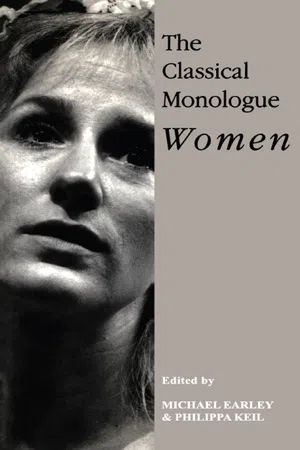To hear Horatio plead with Rhadamanth.6
6 Rhadamanth Radamanthus, one of the mythical judges of the underworld Make haste, Hieronimo, to hold excused
Thy negligence in pursuit of their deaths,
Whose hateful wrath bereaved him of his breath.
Ah, nay, thou dost delay their deaths
Forgives the murderers of thy noble son,
And none but I bestir me – to no end!
And as I curse this tree from further fruit,
So shall my womb be cursèd for his sake;
And with this weapon will I wound the breast,
The hapless breast, that gave Horatio suck.
She stabs herself.
[lines 1–38]
commentary: Kyd’s The Spanish Tragedy was one of the most popular and influential Elizabethan plays. It created a vogue for a ghoulish form of melodrama and its impact can be seen in other famous revenge tragedies, most notably Shakespeare’s Hamlet. It is full of ghosts, deceit and outrageous villainy. The play also employs theatrically effective scenes and characters, calculated to excite an audience. An extremely political plot, involving the rivalry between Spain and Portugal, is thrown aside after Don Horatio, Hieronimo’s son, is murdered by Don Balthazar, a violent Portuguese prince, and a rival for the hand of Bel-Imperia. The death and discovery of Horatio unleash a chain of incidents that culminates in the punishment of the villains and the separate suicides of Hieronimo and his wife Isabella.
Isabella, a very minor character in the play, suddenly comes to dramatic life in this very late scene. Neither justice nor revenge has rooted out the murderers of her son, leaving her mad and in despair. So Isabella decides to take ‘justice’ into her own hands. With a knife as a kind of scythe she chops down the vines and branches in her arbour, the scene of her son’s murder and where he was found hanging from a tree (the ‘fatal pine’). Powerless to be a revenger herself (that is a role reserved for her husband Hieronimo), Isabella can only take revenge on the scene of the murder. This is an incredibly physical scene. Isabella is one of the first in a long line of Elizabethan and Jacobean madwomen who usually play scenes of madness with their hair loose to indicate the venting of emotion and lack of constraint. Her speech, in blank verse, puts into words her shock and trauma at the memory of her son’s death. The brutal, macabre murder carried out at night in the garden has given the scene a weird and forbidding atmosphere. The actor should notice that Isabella expresses her grief in deeply vocalised vowels, particularly the ‘o’ sounds at the start: ‘Tell me no more – O monstrous homicides!’ Sorrow becomes a deeply felt emotion echoed in the very words themselves. The garden itself and each of the plants becomes a personified accomplice in the murder, even the very air participated in the crime. Isabella wants revenge since she cannot have justice. The most surprising aspect of the speech is her abrupt suicide at the end, unprepared for and very swift. The dramatic consequence of this scene is that it will force Hieronimo to finally revenge the murder so it must be performed with high impact.
